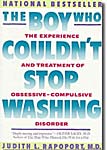Obsessive-Compulsive Disorder
 Obsessive-Compulsive Disorder (OCD), usually begins in adolescence or young adulthood and is seen in as many as 1 in 200 children and adolescents according to the National Institute of Mental Health.
Obsessive-Compulsive Disorder (OCD), usually begins in adolescence or young adulthood and is seen in as many as 1 in 200 children and adolescents according to the National Institute of Mental Health.
OCD is characterized by recurrent obsessions and/or compulsions that are intense enough to cause severe discomfort. Obsessions are recurrent and persistent thoughts, impulses, or images that are unwanted and cause marked anxiety, distress or interfere with daily functioning. Often, they are unrealistic or irrational. They are not simply excessive worries about real-life problems or preoccupations. Compulsions are repetitive behaviors or rituals (like hand washing, hoarding, keeping things in order, “checking” something over and over) or mental acts (like counting, repeating words silently, avoiding things). In OCD, the obsessions or compulsions cause significant anxiety or distress, or they interfere with the person’s normal routine, academic functioning, social activities, and or relationships.
 The obsessive thoughts may vary with the age and may change over time. A younger child with OCD may fear that harm will occur to himself or a family member, for example an intruder entering an unlocked door or window. The child may compulsively check all the doors and windows of his home after his parents are asleep in an attempt to relieve anxiety. The child may then fear that he may have accidentally unlocked a door or window while last checking and locking, and then must compulsively check again.
The obsessive thoughts may vary with the age and may change over time. A younger child with OCD may fear that harm will occur to himself or a family member, for example an intruder entering an unlocked door or window. The child may compulsively check all the doors and windows of his home after his parents are asleep in an attempt to relieve anxiety. The child may then fear that he may have accidentally unlocked a door or window while last checking and locking, and then must compulsively check again.
A teenager with OCD may fear that he will become ill with germs, AIDS, or contaminated food. To cope with his/her feelings, a child may develop “rituals” (a behavior or activity that gets repeated). Sometimes the obsession and compulsion are linked; “I fear this bad thing will happen if I stop checking or hand washing, so I can’t stop even if it doesn’t make any sense.”
Research shows that OCD is a brain disorder and tends to run in families, although this doesn’t mean the child will definitely develop symptoms. Recent studies have also shown that OCD may develop or worsen after a strep infection, although there is still some debate over this. A child may also develop OCD with no previous family history.
Adolescents and adults often feel shame and embarrassment about their OCD. Many fear it means they’re crazy. Good communication between parents and teenagers can increase understanding of the problem and help the parents appropriately support their child.
 Most teens with OCD can be treated effectively with a combination of psychotherapy (especially cognitive and behavioral techniques) and certain medications for example, serotonin reuptake inhibitors (SSRI’s). Family support and education are also central to the success of treatment. Antibiotic therapy may be useful in cases where OCD is linked to streptococcal infection.
Most teens with OCD can be treated effectively with a combination of psychotherapy (especially cognitive and behavioral techniques) and certain medications for example, serotonin reuptake inhibitors (SSRI’s). Family support and education are also central to the success of treatment. Antibiotic therapy may be useful in cases where OCD is linked to streptococcal infection.
An adolescent psychiatrist is an important educator to help all family members better understand the complex issues created by OCD as well as to get help for the teenager it affects. This is an issue that will have implications for the whole family.
- Recommended article from July 2004 — A Hard Habit to Break
- Get Information on Natural Remedies for OCD
Recommended Reading:

The Boy Who Couldn’t Stop Washing: The Experience and Treatment of Obsessive-Compulsive Disorder by Judith L. Rapoport, MD. The first book to bring OCD to public attention tells the stories of those who are afflicted, often in their own words, and describes the successes doctors and patients have had with both experimental and existing treatments.
Resources:
Visit the NIMH (National Institute of Mental Health) site. NIMH.gov
Facts for Families © is developed and distributed by the American Academy of Child and Adolescent Psychiatry. Facts sheets may be reproduced for personal or educational use without written permission, but cannot be included in material presented for sale or profit.
Part of this article was used with permission from the American Academy of Child and Adolescent Psychiatry and the NIH. Copyright © 1999 by the American Academy of Child & Adolescent Psychiatry – AACAP
- For more information, see the Mental Health Video library…
- For information on Anxiety and Anxiety Disorders, read these or hear the videos.
